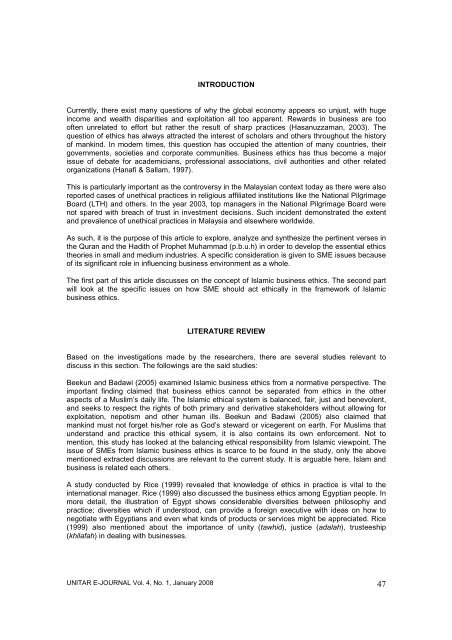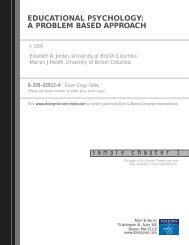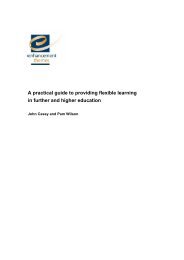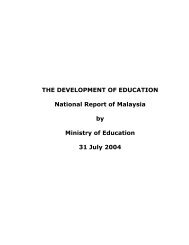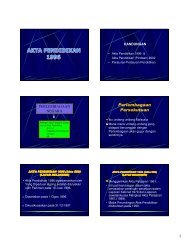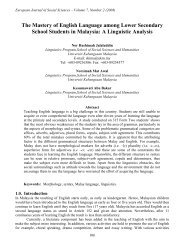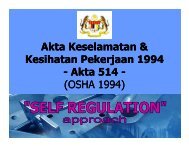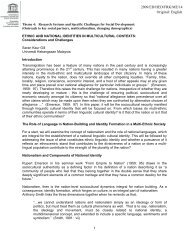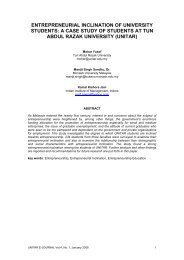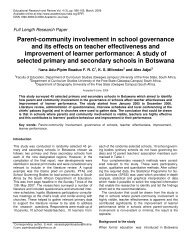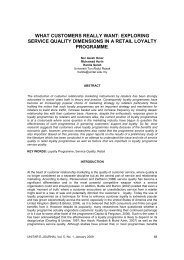INTRODUCTIONCurrently, there exist many questions <strong>of</strong> why the global economy appears so unjust, with huge<strong>in</strong>come <strong>and</strong> wealth disparities <strong>and</strong> exploitation all too apparent. Rewards <strong>in</strong> bus<strong>in</strong>ess are too<strong>of</strong>ten unrelated to effort but rather the result <strong>of</strong> sharp practices (Hasanuzzaman, 2003). Thequestion <strong>of</strong> ethics has always attracted the <strong>in</strong>terest <strong>of</strong> scholars <strong>and</strong> others throughout the history<strong>of</strong> mank<strong>in</strong>d. In modern times, this question has occupied the attention <strong>of</strong> many countries, theirgovernments, societies <strong>and</strong> corporate communities. Bus<strong>in</strong>ess ethics has thus become a majorissue <strong>of</strong> debate for academicians, pr<strong>of</strong>essional associations, civil authorities <strong>and</strong> other relatedorganizations (Hanafi & Sallam, 1997).This is particularly important as the controversy <strong>in</strong> the Malaysian context today as there were alsoreported cases <strong>of</strong> unethical practices <strong>in</strong> religious affiliated <strong>in</strong>stitutions like the National PilgrimageBoard (LTH) <strong>and</strong> others. In the year 2003, top managers <strong>in</strong> the National Pilgrimage Board werenot spared with breach <strong>of</strong> trust <strong>in</strong> <strong>in</strong>vestment decisions. Such <strong>in</strong>cident demonstrated the extent<strong>and</strong> prevalence <strong>of</strong> unethical practices <strong>in</strong> Malaysia <strong>and</strong> elsewhere worldwide.As such, it is the purpose <strong>of</strong> this article to explore, analyze <strong>and</strong> synthesize the pert<strong>in</strong>ent verses <strong>in</strong>the Quran <strong>and</strong> the Hadith <strong>of</strong> Prophet Muhammad (p.b.u.h) <strong>in</strong> order to develop the essential ethicstheories <strong>in</strong> small <strong>and</strong> medium <strong>in</strong>dustries. A specific consideration is given to SME issues because<strong>of</strong> its significant role <strong>in</strong> <strong>in</strong>fluenc<strong>in</strong>g bus<strong>in</strong>ess environment as a whole.The first part <strong>of</strong> this article discusses on the concept <strong>of</strong> <strong>Islamic</strong> bus<strong>in</strong>ess ethics. The second partwill look at the specific issues on how SME should act ethically <strong>in</strong> the framework <strong>of</strong> <strong>Islamic</strong>bus<strong>in</strong>ess ethics.LITERATURE REVIEWBased on the <strong>in</strong>vestigations made by the researchers, there are several studies relevant todiscuss <strong>in</strong> this section. The follow<strong>in</strong>gs are the said studies:Beekun <strong>and</strong> Badawi (2005) exam<strong>in</strong>ed <strong>Islamic</strong> bus<strong>in</strong>ess ethics from a normative perspective. Theimportant f<strong>in</strong>d<strong>in</strong>g claimed that bus<strong>in</strong>ess ethics cannot be separated from ethics <strong>in</strong> the otheraspects <strong>of</strong> a Muslim’s daily life. The <strong>Islamic</strong> ethical system is balanced, fair, just <strong>and</strong> benevolent,<strong>and</strong> seeks to respect the rights <strong>of</strong> both primary <strong>and</strong> derivative stakeholders without allow<strong>in</strong>g forexploitation, nepotism <strong>and</strong> other human ills. Beekun <strong>and</strong> Badawi (2005) also claimed thatmank<strong>in</strong>d must not forget his/her role as God’s steward or vicegerent on earth. For Muslims thatunderst<strong>and</strong> <strong>and</strong> practice this ethical sysem, it is also conta<strong>in</strong>s its own enforcement. Not tomention, this study has looked at the balanc<strong>in</strong>g ethical responsibility from <strong>Islamic</strong> viewpo<strong>in</strong>t. Theissue <strong>of</strong> <strong>SMEs</strong> from <strong>Islamic</strong> bus<strong>in</strong>ess ethics is scarce to be found <strong>in</strong> the study, only the abovementioned extracted discussions are relevant to the current study. It is arguable here, Islam <strong>and</strong>bus<strong>in</strong>ess is related each others.A study conducted by Rice (1999) revealed that knowledge <strong>of</strong> ethics <strong>in</strong> practice is vital to the<strong>in</strong>ternational manager. Rice (1999) also discussed the bus<strong>in</strong>ess ethics among Egyptian people. Inmore detail, the illustration <strong>of</strong> Egypt shows considerable diversities between philosophy <strong>and</strong>practice; diversities which if understood, can provide a foreign executive with ideas on how tonegotiate with Egyptians <strong>and</strong> even what k<strong>in</strong>ds <strong>of</strong> products or services might be appreciated. Rice(1999) also mentioned about the importance <strong>of</strong> unity (tawhid), justice (adalah), trusteeship(khilafah) <strong>in</strong> deal<strong>in</strong>g with bus<strong>in</strong>esses.UNITAR E-JOURNAL Vol. 4, No. 1, January 2008 47
Accord<strong>in</strong>g to study reported by Abeng (1997), all bus<strong>in</strong>ess practices <strong>in</strong>volve explicit or implicitharm <strong>and</strong> <strong>in</strong>justice to the contract<strong>in</strong>g parties or to the public at large are disapproved by Islam.Further, <strong>in</strong> order to build a good bus<strong>in</strong>ess, any bus<strong>in</strong>esses must have a good Muslim bus<strong>in</strong>essleader that will drive the bus<strong>in</strong>ess <strong>in</strong>to lawful bus<strong>in</strong>ess as <strong>in</strong>tended by Shariah. Abeng (1997) alsonoted that there are six components needed to be understood by Muslim bus<strong>in</strong>ess leaders.Among others, are fulfillment <strong>of</strong> promises, exactness <strong>in</strong> weights <strong>and</strong> measures, truthfulness,efficiency, selection <strong>of</strong> merit <strong>and</strong> <strong>in</strong>vestigation <strong>and</strong> verification. By <strong>in</strong>corporat<strong>in</strong>g thesecomponents, all bus<strong>in</strong>ess practices will be treated as permissible as required by ShariahIslamiyyah. This study, <strong>in</strong>deed, provides general guidel<strong>in</strong>es for the current study <strong>in</strong> identify<strong>in</strong>gmeasures that better reflect <strong>SMEs</strong>.In this section, the researchers also discuss a number <strong>of</strong> survey based studies that producedmixed results <strong>and</strong> research implications. The follow<strong>in</strong>gs are some <strong>of</strong> many other studies exist <strong>in</strong>bus<strong>in</strong>ess ethics:A study conducted by Fulop et al. (2000) discovered there was no significant relationshipbetween the companies’ output <strong>and</strong> social responsibility. The comparison by <strong>in</strong>dustry <strong>in</strong>dicatedthat efficient resource management is important for the energy <strong>and</strong> process<strong>in</strong>g <strong>in</strong>dustries, while<strong>in</strong>novation is important for chemical <strong>and</strong> eng<strong>in</strong>eer<strong>in</strong>g companies <strong>and</strong> fair salaries <strong>and</strong> wages isimportant for the energy <strong>and</strong> construction companies. Fulop et al. (2000) also <strong>in</strong>dicated that therewas favorable reaction regard<strong>in</strong>g ethical codes, the ethical managers <strong>and</strong> committees, <strong>and</strong> theethical audit. In the implementation <strong>of</strong> ethical practices, communication problems with<strong>in</strong> thecompany, expected law changes, compla<strong>in</strong>ts <strong>of</strong> customers <strong>and</strong> changes <strong>in</strong> management <strong>and</strong>ownership played an important role. While implementation <strong>of</strong> ethical practices had positive resultsfor most <strong>of</strong> the companies, a few companies had a negative experience.A study conducted by Lee (1981) on ethical beliefs <strong>of</strong> the British <strong>and</strong> Ch<strong>in</strong>ese managers, <strong>and</strong>between the top management <strong>and</strong> middle management <strong>in</strong> the market<strong>in</strong>g management. In moredetail, found that there were no differences <strong>in</strong> the ethical st<strong>and</strong>ards <strong>in</strong> market<strong>in</strong>g between theBritish <strong>and</strong> Ch<strong>in</strong>ese managers <strong>in</strong> Hong Kong. Lee (1981) also believed that this was due toacculturation <strong>of</strong> the managers to local bus<strong>in</strong>ess practices.Among other purposes, Zabid (1989) study on bus<strong>in</strong>ess ethics among Malays, Ch<strong>in</strong>ese <strong>and</strong>Indian managers <strong>in</strong> the bank<strong>in</strong>g sector <strong>in</strong> Malaysia. Zabid (1989) <strong>in</strong>dicated there were differencesfound <strong>in</strong> bus<strong>in</strong>ess practices relat<strong>in</strong>g to "malpractices <strong>in</strong> sales" <strong>and</strong> "ga<strong>in</strong><strong>in</strong>g <strong>of</strong> competitor<strong>in</strong>formation". The Indian managers perceived these two bus<strong>in</strong>ess situations as more unethicalthan the Malays or Ch<strong>in</strong>ese. The Ch<strong>in</strong>ese managers perceived "malpractice <strong>in</strong> sales" as moreunethical than the Malays. The Ch<strong>in</strong>ese managers, however, perceived that "ga<strong>in</strong><strong>in</strong>g <strong>of</strong>competitor <strong>in</strong>formation" as less unethical than the Malays or Indian managers.DISCUSSIONThe Concepts <strong>of</strong> Bus<strong>in</strong>ess <strong>Ethics</strong> <strong>in</strong> <strong>Islamic</strong> Context<strong>Ethics</strong> <strong>in</strong> general can be def<strong>in</strong>ed as the system <strong>of</strong> rules govern<strong>in</strong>g the order<strong>in</strong>g <strong>of</strong> values(Bateman & Snell, 2002). <strong>Ethics</strong> also refers to the rightness or wrongness <strong>of</strong> the decisions <strong>and</strong>behaviors <strong>of</strong> <strong>in</strong>dividuals <strong>and</strong> the organizations <strong>of</strong> which they are a part (Hellriegel et. al, 2001).Bus<strong>in</strong>ess ethics sometimes referred to the moral pr<strong>in</strong>ciples <strong>and</strong> st<strong>and</strong>ards that guide behavior <strong>in</strong>the world <strong>of</strong> bus<strong>in</strong>ess.The aim <strong>of</strong> ethics is to identify both the rules that should govern people’s behavior <strong>and</strong> the“goods” that are worth seek<strong>in</strong>g. In fact, ethical issues <strong>in</strong>fluence the decision that employees makedaily. Some ethical issues <strong>in</strong>volve factors that blur the dist<strong>in</strong>ction between “right” <strong>and</strong> “wrong”. AsUNITAR E-JOURNAL Vol. 4, No. 1, January 2008 48


